- Home
- Stanley G. Weinbaum
The 27th Golden Age of Science Fiction Page 4
The 27th Golden Age of Science Fiction Read online
Page 4
“Don’t!” he said sharply.
“Why not?”
“Let’s not talk about me, Pat. It—embarrasses me.”
“All right, Mr. Modesty! Let’s talk about me, then. I’ll promise we won’t succeed in embarrassing me.”
“And it’s quite the most interesting subject in the world, Pat.”
“Well, then?”
“What?”
“Why don’t you start talking? The topic is all attention.”
He chuckled. “How many men have told you you were beautiful, Pat?”
“I never kept account.”
“And in many different ways?”
“Why? Have you, perchance, discovered a new way, Nick?”
“Not at all. The oldest way of any, the way of Sappho and Pindar.”
“O-ooh!” She clapped her hands in mock delight. “Poetry!”
“The only medium that could possibly express how lovely you are,” said Nick.
“Nicholas, have you gone and composed a poem to me?”
“Composed? No. It isn’t necessary, with you here beside me.”
“What’s that? Some very subtle compliment?”
“Not subtle, Pat. You’re the poem yourself; all I need do is look at you, listen to you, and translate.”
“Neat!” applauded the girl. “Do I hear the translation?”
“You certainly do.” He turned his odd amber-green eyes on her, then bent forward to the road. He began to speak in a low voice.
“In no far country’s silent ways
Shall I forget one little thing—
The soft intentness of your gaze,
The sweetness of your murmuring
Your generously tender praise,
The words just hinted by a breath—
In no far country’s silent way,
Unless that country’s name be Death—”
He paused abruptly, and drove silently onward.
“Oh,” breathed Pat. “Why don’t you go on, Nick? Please.”
“No. It isn’t the mood for this night, Dear. Not this night, alone with you.”
“What is, then?”
“Nothing sentimental. Something lighter, something—oh, Elizabethan. That’s it.”
“And what’s stopping you?”
“Lack of an available idea. Or—wait. Listen a moment.” He began, this time in a tone of banter.
“When mornings, you attire yourself
For riding in the city,
You’re such a lovely little elf,
Extravagantly pretty!
And when at noon you deign to wear
The habit of the town,
I cannot call to mind as fair
A symphony in brown.
“Then evenings, you blithely don
A daintiness of white,
To flash a very paragon
Of lightsomeness—and light!
But when the rounds of pleasure cease,
And you retire at night,
The Godling on your mantelpiece
Must know a fairer sight!”
“Sweet!” laughed Pat. “But personal. And anyway, how do you know I’ve a godling on my mantel? Don’t you credit me with any modesty?”
“If you haven’t, you should have! The vision I mentioned ought to enliven even a statue.”
“Well,” said the girl, “I have one—a jade Buddha, and with all the charms I flash before him nightly, he’s never batted an eyelash. Explain that!”
“Easily. He’s green with envy, and frozen with admiration, and struck dumb by wonder.”
“Heavens! I suppose I ought to be thankful you didn’t say he was petrified with fright!” Pat laughed. “Oh Nick,” she continued, in a voice gone suddenly dreamy, “this is marvelous, isn’t it? I mean our enjoying ourselves so completely, and our being satisfied to be so alone. Why, we’ve never even danced together.”
“So we haven’t. That’s a subterfuge we haven’t needed, isn’t it?”
“It is,” replied the girl, dropping her glossy gleaming black head against his shoulder. “And besides, it’s much more satisfactory to be held in your arms in private, instead of in the midst of a crowd, and sitting down, instead of standing up. But I should like to dance with you, Nick,” she concluded.
“We’ll go dancing, then, whenever you like.”
“You’re delightfully complaisant, Nick. But—you’re puzzling.” She glanced up at him. “You’re so—so reluctant. Here we’ve been driving an hour, and you haven’t tried to kiss me a single time, and yet I’m quite positive you care for me.”
“Lord, Pat!” he muttered. “You never need doubt that.”
“Then what is it? Are you so spiritual and ethereal, or is my attraction for you just sort of intellectual? Or—are you afraid?” As he made no reply, she continued, “Or are those poems you spout about my physical charms just—poetic license?”
“They’re not, and you know it!” he snapped. “You’ve a mirror, haven’t you? And other fellows than I have taken you around, haven’t they?”
“Oh, I’ve been taken around! That’s what perplexes me about you, Nick. I’d think you were actually afraid of kissing me if it weren’t—” Her voice trailed into silence, and she stared speculatively ahead at the ribbon of road that rolled steadily into the headlights’ glare.
She broke the interval of wordlessness. “What is it, Nick?” she resumed almost pleadingly. “You’ve hinted at something now and then. Please—you don’t have to hesitate to tell me; I’m modern enough to forgive things past, entanglements, affairs, disgraces, or anything like that. Don’t you think I should know?”
“You’d know,” he said huskily, “if I could tell you.”
“Then there is something, Nick!” She pressed his arm against her. “Tell me, isn’t there?”
“I don’t know.” There was the suggestion of a groan in his voice.
“You don’t know! I can’t understand.”
“I can’t either. Please, Pat, let’s not spoil tonight; if I could tell you, I would. Why, Pat, I love you—I’m terribly, deeply, solemnly in love with you.”
“And I with you, Nick.” She gazed ahead, where the road rose over the arch of a narrow bridge. The speeding car lifted to the rise like a zooming plane.
And suddenly, squarely in the center of the road, another car, until now concealed by the arch of the bridge, appeared almost upon them. There was a heart-stopping moment when a collision seemed inevitable, and Pat felt the arm against her tighten convulsively into a bar of steel. She heard her own sobbing gasp, and then, somehow, they had slipped unscathed between the other car and the rail of the bridge.
“Oh!” she gasped faintly, then with a return of breath, “That was nice, Nick!”
Beyond the bridge, the road widened once more; she felt the car slowing, edging toward the broad shoulder of the road.
“There was danger,” said her companion in tones as emotionless as the rasping of metal. “I came to save it.”
“Save what?” queried Pat as the car slid to a halt on the turf.
“Your body.” The tones were still cold, like grinding wheels. “The beauty of your body!”
He reached a thin hand toward her, suddenly seized her skirt and snatched it above the silken roundness of her knees. “There,” he rasped. “That is what I mean.”
“Nick!” Pat half-screamed in appalled astonishment. “How—” She paused, shocked into abrupt silence, for the face turned toward her was but a remote, evil caricature of Nicholas Devine’s. It leered at her out of blood-shot eyes, as if behind the mask of Nick’s face peered a red-eyed demon.
CHAPTER 5
A Fantasy of Fear
The satyr beside pat was leaning toward her; the arm about her was tightening w
ith a brutal ruthlessness, and while still staring in fascination at the incredible eyes, she realized that another arm and a white hand was moving relentlessly, exploratively, toward her body. It was the cold touch of this hand as it slipped over her silk-sheathed legs that broke the chilling spell of her fascination.
“Nick!” she screamed. “Nick!” She had a curious sensation of calling him back from far distances, the while she strove with both hands and all her strength to press him back from her. But the ruthless force of his arms was overcoming her resistance; she saw the red eyes a hand’s breadth from her own.
“Nick!” she sobbed in terror.
There was a change. Abruptly, she was looking into Nick’s eyes, blood-shot, frightened, puzzled, but indubitably Nick’s eyes. The flaming orbs of the demon were no more; it was as if they had receded into Nick’s head. The arm about her body relaxed, and they were staring at each other in a medley of consternation, amazement and unbelief. The youth drew back, huddled in his corner of the car, and Pat, breathing in sobs, smoothed out her rumpled apparel with a convulsive movement.
“Pat!” he gasped. “Oh, my God! He couldn’t have—” He paused abruptly. The girl gazed at him without reply.
“Pat, Dear,” he spoke in a low, tense murmur, “I’m—sorry. I don’t know—I don’t understand how—”
“Never mind,” she said, regaining a vestige of her customary composure. “It’s—all right, Nick.”
“But—oh, Pat—!”
“It was that near accident,” she said. “That upset you—both of us, I mean.”
“Yes!” he said eagerly. “That’s what it was, Pat. It must have been that, but Dear, can you forgive? Do you want to forgive me?”
“It’s all right,” she repeated. “After all, you just complimented my legs, and I guess I can stand that. It’s happened before, only not quite so—convincingly!”
“You’re sweet, Pat!”
“No; I just love you Nick.” She felt a sudden pity for the misery in his face. “Kiss me, Nick—only gently.”
He pressed his lips to hers, very lightly, almost timidly. She lay back against the seat for a moment, her eyes closed.
“That’s you again,” she murmured. “This other—wasn’t.”
“Please, Pat! Don’t refer to it,—not ever.”
“But it wasn’t you, Nick. It was just the strain of that narrow escape. I don’t hold it against you.”
“You’re—Lord, Pat, I don’t deserve you. But you know that I—I myself—could never touch you except in tenderness, even in reverence. You’re too dainty, too lovely, too spirited, to be hurt, or to be held roughly, against your will. You know I feel that way about you, don’t you?”
“Of course. It was nothing, Nick. Forget it.”
“If I can,” he said somberly. He switched on the engine, backed out upon the pavement, and turned the car toward the glow that marked Chicago. Neither of them spoke as the machine hummed over the arching bridge and down the slope, where, so few minutes before, the threat of accident had thrust itself at them.
“We won’t see a moon tonight,” said Pat in a small voice, after an interval. “We’ll never check up on Dr. Carl’s astronomy.”
“You don’t want to tonight, Pat, do you?”
“I guess perhaps we’d better not,” she replied. “We’re both upset, and there’ll be other nights.”
Again they were silent. Pat felt strained, shaken; there was something uncanny about the occurrence that puzzled her. The red eyes that had glared out of Nick’s face perplexed her, and the curious rasping voice he had used still sounded inhumanly in her memory. Out of recollection rose still another mystery.
“Nick,” she said, “what did you mean—then—when you said there was danger and you came to save me?”
“Nothing,” he said sharply.
“And then, afterwards, you started to say something about ‘He couldn’t have—’. Who’s ‘he’?”
“It meant nothing, I tell you. I was frantic to think you might have been hurt. That’s all.”
“I believe you, Honey,” she said, wondering whether she really did. The thing was beginning to grow hazy; already it was assuming merely the proportions of an upheaval of youthful fervor. Such occurrences were not unheard of, though never before had it happened to Patricia Lane! Still, even that was conceivable, far more conceivable than the dark, unformed, inchoate suspicions she had been harboring. They hadn’t even been definite enough to be called suspicions; indefinite apprehensions came closer.
And yet—that strange, wild face that had formed itself of Nick’s fine features, and the terrible red eyes! Were they elements in a picture conjured out of her own imagination? They must be, of course. She had been frightened by that hairbreadth escape, and had seen things that didn’t exist. And the rest of it—well, that might be natural enough. Still, there was something—she knew that; Nick had admitted it.
Horker’s words concerning Nick’s father rose in her mind. Suspected of being crazy! Was that it? Was that the cause of Nick’s curious reluctance where she was concerned? Was the face that had glared at her the visage of a maniac? It couldn’t be. It couldn’t be, she told herself fiercely. Not her fine, tender, sensitive Nick! And besides, that face, if she hadn’t imagined it, had been the face, not of a lunatic, but of a devil. She shook her head, as if to deny her thoughts, and placed her hand impulsively on Nick’s.
“I don’t care,” she said. “I love you, Nick.”
“And I you,” he murmured. “Pat, I’m sorry about spoiling this evening. I’m sorry and ashamed.”
“Never mind, Honey. There’ll be others.”
“Tomorrow?”
“No,” she said. “Mother and I are going out to dinner. And Friday we’re having company.”
“Really, Pat? You’re not just trying to turn me off gently.”
“Really, Nick. Try asking me for Saturday evening and see!”
“You’re asked, then.”
“And it’s a date.” Then, with a return of her usual insouciance, she added. “If you’re on good behavior.”
“I will be. I promise.”
“I hope so,” said Pat. An inexplicable sense of foreboding had come over her; despite her self-given assurances, something unnameable troubled her. She gave a mental shrug, and deliberately relegated the unpleasant cogitations to oblivion.
The car turned into Dempster Road; the lights of the teeming roadhouses, dance halls, road-side hamburger and barbecue stands flashed by. There were many cars here; there was no longer any impression of solitude now, in the overflow from the vast city in whose shadow they moved. The incessant flow of traffic gave the girl a feeling of security; these were tangible things about her, and once more the memory of that disturbing occurrence became dim and dreamlike. This was Nick beside her, gentle, intelligent, kind; had he ever been otherwise? It seemed highly unreasonable, a fantasy of fear and the hysteria of the moment.
“Hungry?” asked Nick unexpectedly.
“I could use a barbecue, I guess. Beef.”
The car veered to the graveled area before a brightly lit stand. Nick gave the order to an attendant. He chuckled as Pat, with the digestive disregard of youth attacked the greasy combination.
“That’s like a humming bird eating hay!” he said. “Or better, like a leprechaun eating that horse-meat they can for dogs.”
“You might as well discover that I don’t live on honey and rose-petals,” said Pat. “Not even on caviar and terrapin—at least, not exclusively. I leave the dainty palate for Mother to indulge.”
“Which is just as well. Hamburger and barbecue are more easily budgeted.”
“Nicholas,” said the girl, tossing the paper napkin out of the car window, “is that an indirect and very evasive proposal of marriage?”
“You know it could be, if you wished it!”
/>
“And do I?” she said, assuming a pensive air. “I wonder. Suppose we say I’ll let you know later.”
“And meanwhile?”
“Oh, meanwhile we can be sort of engaged. Just the way we’ve been.”
“You’re sweet, Pat,” he murmured, as the car edged into the line of traffic. “I don’t know just how to convey my appreciation, but it’s there!”
The buildings drew more closely together; the road was suddenly a lighted street, and then, almost without realizing it, they were before Pat’s home. Nick walked beside her to the door; he stood facing her hesitantly.
“Good night, Pat,” he said huskily. He leaned down, kissing her very gently, turned, and departed.
The girl watched him from the open doorway, following the lights of his car until they vanished down the street. Dear, sweet Nick! Then the disturbing memory of that occurrence of the evening returned; she frowned in perplexity as the thought rose. That was all of a piece with the puzzling character of him, and the curious veiled references he’d made. References to what? She didn’t know, couldn’t imagine. Nick had said he didn’t know either, which added still another quirk to the maze.
She thought of Dr. Horker’s words. With the thought, she glanced at his house, adjacent to her own home. A light gleamed in the library; he was still awake. She closed the door behind her, and darted across the narrow strip of lawn to his porch. She rang the bell.
“Good evening, Dr. Carl,” she said as the massive form of Horker appeared. She puckered her lips impudently at him as she slipped by him into the house.
CHAPTER 6
A Question of Science
“Not that I’m displeased at this visit, Pat,” rumbled the Doctor, seating himself in one of the great chairs by the fireplace, “but I’m curious. I thought you were dating your ideal tonight, yet here you are, back alone a little after eleven. How come?”
“Oh,” said the girl nonchalantly, dropping crosswise in the other chair, “we decided we needed our beauty sleep.”
“Then why are you here, you young imp?”
“Thought you might be lonesome.”
“I’ll bet you did! But seriously, Pat, what is it? Any trouble?”

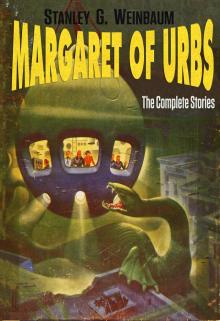 The Complete Margaret of Urbs
The Complete Margaret of Urbs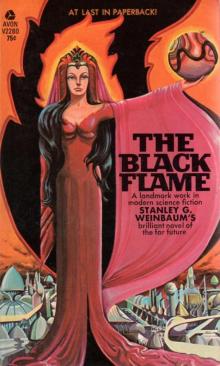 The Black Flame
The Black Flame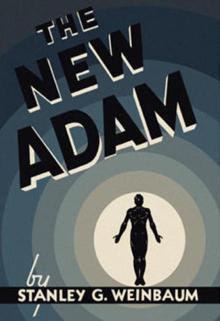 The New Adam
The New Adam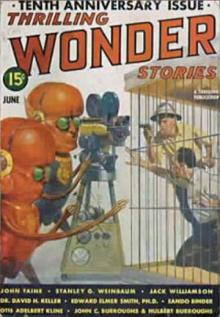 Dawn of Flame
Dawn of Flame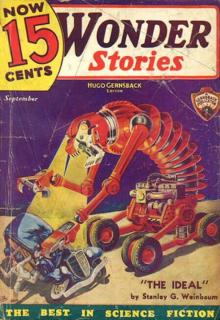 The Ideal
The Ideal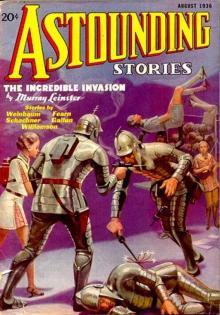 Proteus Island
Proteus Island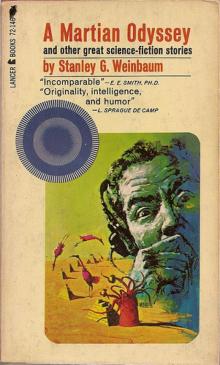 The Worlds of If
The Worlds of If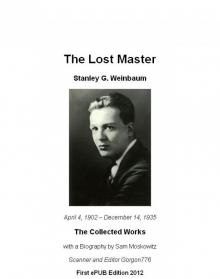 The Lost Master - The Collected Works
The Lost Master - The Collected Works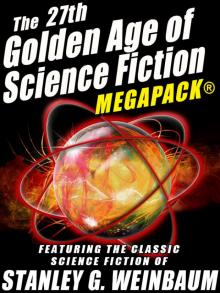 The 27th Golden Age of Science Fiction
The 27th Golden Age of Science Fiction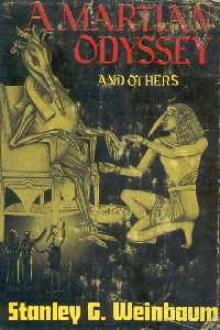 A Martian Odyssey
A Martian Odyssey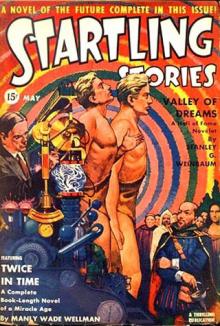 Valley of Dreams
Valley of Dreams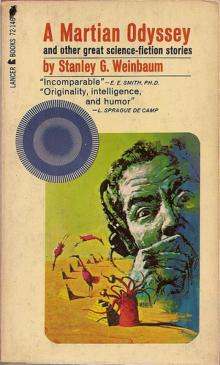 The Point of View
The Point of View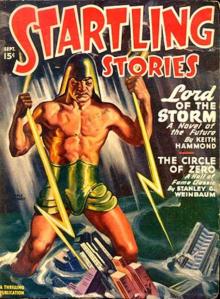 The Circle of Zero
The Circle of Zero